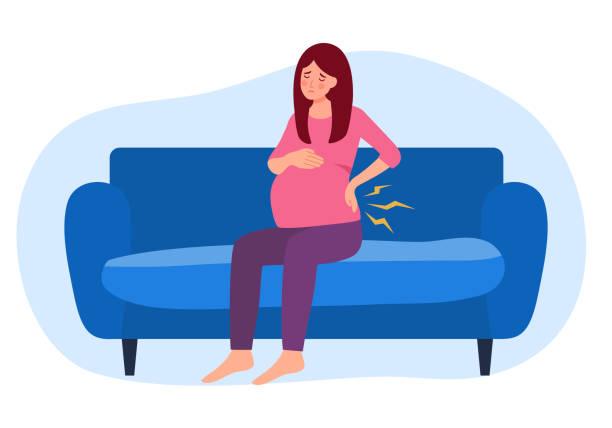
Back Pain During Pregnancy: 7 tips for relief

There’s no shortage of new body changes, strange symptoms, and temporary discomforts during pregnancy — and back pain is chief among them. Most people experience back pain at some point in their pregnancy, usually in the second and third trimester. But although back pain is common, you don’t have to just deal with it.
What causes back pain in pregnancy? How can you prevent and manage it? Let’s take a closer look.
Why Does My Back Hurt?
There’s a lot going on in your body as your baby grows. Many issues can affect back pain, including:
• Hormonal changes. Pregnancy hormones loosen supportive ligaments in your low back and pelvis (the sacroiliac joints) in preparation for labor and delivery. This is normal and healthy, but it can strain the muscles and joints in your back and cause pain.
• Shifting center of gravity. As your baby grows, your center of gravity shifts forward to compensate. Resulting changes in your posture can increase the stress on joints, nerves, and muscles in your back.
• Weaker abdominal muscles. Your expanding uterus causes abdominal muscles to separate (called diastasis recti). This reduces support for your pelvis and spine and causes back pain.
• Stress. The normal stress of pregnancy and daily life can make your back muscles tense, leading to pain and muscle spasms.
• Pre-existing back pain. If you had back pain before pregnancy you might be at higher risk of experiencing it during pregnancy. It’s more likely to happen earlier in your pregnancy.
What Can I Do to Manage Back Pain During Pregnancy?
Pregnancy-related back pain is very common, but there are many things you can do to ease your pain:
1. Get or stay active. Exercise is not only safe, but highly recommended because of its many health benefits for you and your baby (including decreasing back pain). Your Zanskar Health exercises are a great starting point. Activities such as walking, swimming and water aerobics, yoga, and using light weights or your body weight for resistance training are also recommended during pregnancy. Ask your care team for activity suggestions and exercise considerations for each trimester.
2. Watch how you move and sit. Minor adjustments to your posture can help prevent back pain. When you stand, use a wider two-footed stance or rest one foot on a low stool. Choose chairs that support your back or use a lumbar support pillow. Keep these principles of good posture in mind:
- Stand up straight and tall, with comfortable wide stance for support.
- Hold your chest high.
- Keep your shoulders back and relaxed.
- Don’t lock your knees.
3. Skip the high heels (and certain flats). Shoes with a low heel and good arch support are better for pregnancy-related back pain than flat shoes with no support (like many flip-flops or ballet slippers) or high heels.
4. Lift Properly. When lifting a small object, squat down and lift with your legs. Don’t bend at the waist or lift with your back. It’s also important to know your limits. Ask for help if you need it.
5. Aim for a good night’s sleep. When you get quality sleep, you tend to have less pain. And when you have less pain, it helps you sleep. Although many factors can mess with your sleep — especially during pregnancy — try these tips:
- Try not to sleep on your back after 20 weeks. This can compress major blood vessels and make back pain worse.
- Not a natural side sleeper? Place pillows under your belly and between your knees to help you snooze more comfortably.
6. Try massage, a heating pad, or ice packs to turn down the volume on your pain. Place a towel between your skin and the heating pad or ice pack to protect your skin.
7. Ask your doctor about pain medications. Acetaminophen can be a safe choice for pain relief in pregnancy, but always consult your doctor before taking any medications during pregnancy. It’s best to avoid NSAIDs (non-steroidal anti-inflammatory drugs) like ibuprofen as some research shows increased risks with these drugs during pregnancy.
When Is Back Pain a Red Flag?
Although back pain is common in pregnancy and usually related to musculoskeletal (MSK) issues, it can sometimes be a warning sign of complications, such as preterm labor or a urinary tract infection. Watch for back pain that occurs with vaginal bleeding or a change in vaginal discharge, fever, contractions, or pain that feels new and cyclical. If you have any of these, contact your doctor.
Remember: You don’t have to accept weeks or months of back pain simply because you are pregnant. You can take steps today to ease your pain and get back to thinking about the exciting journey ahead with your new baby.
Many exercises can help relieve pregnancy-related back pain. Reach out to your Zanskar Health team for advice on which are best for you and whether you would benefit from any care plan modifications.
Key Takeaways
- Many normal and healthy changes in your body that occur during pregnancy can contribute to back pain.
- Back pain during pregnancy is not usually a sign of a serious problem.
- Exercise and many other small lifestyle modifications can help ease pregnancy-related back pain and get you back to thinking about your exciting journey ahead.
- Consider using Zanskar Health mobile app for our pregnancy plans to help ease pain relief with simple exercises and vetted advice for activity modification

Learn More About Zanskar Health
If you have joint or muscle pain that makes it hard to move, Zanskar offers the most advanced full stack pain relief solutions for you.
Now available to purchase, Zanskar® Advanced Pain Healing Cream has a unique formulation of natural ingredients like Arnica, Vitamin B6, MSM and Capsaicin, which is trusted by over 20L+ pain sufferers globally. It provides lasting relief from muscle and joint discomfort that you can feel good about. Get your fix before stocks run out - buy now.
You can also gain access to therapeutic exercises and stretches for your condition by downloading the Zanskar Health physiotherapy mobile app. Additionally, you’ll have a personal care team to guide, support, and tailor our program to you, including behavioral and nutritional coaching.
Download our mobile app here 👉 download and track your exercise streak.
Medical Review: This article is written by Dr Nishtha Mittal (Senior Health Content Editor at Zanskar Health) and has been medically reviewed by Dr Rashi Goel (Senior Physiotherapist at Zanskar Health). This article and its contents are provided for educational and informational purposes only and do not constitute medical advice or professional services specific to you or your medical condition.







